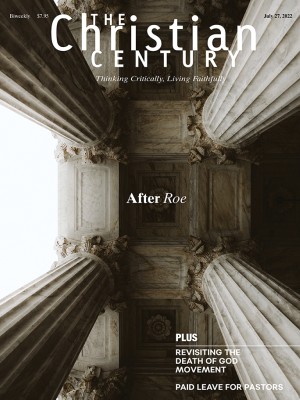Methodists in Texas, Mexico respond after mass death of migrants
After the deaths of 53 migrants in San Antonio, United Methodists in Texas and Mexico are responding with lament, prayer, and renewed efforts to follow Jesus’ command to welcome the stranger.
“We grieve their loss and will continue to work for justice through our United Methodist connection,” Bishop Robert Schnase, whose area includes San Antonio, said in a statement.
Schnase said the United Methodist Church as a whole and the Rio Texas Conference in particular “have a long history of working with partners throughout the connection and the border to provide safe and welcoming places of care and dignity.”
At the same time, people desperate for a safe and welcoming place increasingly are willing to take great risks—including getting inside a tractor trailer with no air-conditioning in the sweltering summer to try to cross the border.
On the evening of June 27, a local worker heard a cry for help and found an abandoned 18-wheeler containing the bodies of migrants who had died without water in heat that reached 103 degrees Fahrenheit.
Forty-eight people died on the scene, and two died at local hospitals, CNN reported. Sixteen people, including four children, were transported alive and conscious to nearby medical facilities. The death toll has since risen to 53.
Law enforcement are investigating what appears to be one of the deadliest incidents of human smuggling along the US-Mexico border. Three suspects, including the suspected truck driver, have since been arrested. San Antonio mayor Ron Nirenberg called the deaths “nothing short of a horrific human tragedy.”
Read our latest issue or browse back issues.
The dead include migrants from Mexico, Guatemala, and Honduras, but authorities are still working to confirm the nationalities of some victims. Mexican president Andres Manuel Lopez Obrador blamed the deaths on “poverty and desperation,” according to news reports. He also blamed human trafficking and a lack of control at the US border.
Immigrants are finding “virtually no way to cross into the United States at a port of entry,” said Katie Myers, a lay leader at Laurel Heights United Methodist Church in San Antonio. She has long worked with immigrants as part of the Interfaith Welcome Coalition, which provides food, supplies, and a basic orientation for refugees and asylum seekers who arrive in San Antonio.
Myers said people are finding their ways blocked because of Title 42—a restriction on immigration due to COVID-19. Title 42, which is being litigated in federal court, essentially suspended the ability of people on the southern border to seek asylum in the United States.
“Incidents like these call on all of us to reassess the ways in which we do or don’t welcome people into the United States, and the ways in which we create processes that put people in danger because of our policies,” Myers said. “We can choose to do things that are more humane, that are more just, that are more merciful.”
Bishop Felipe Ruiz Aguilar, of the Methodist Church of Mexico, said people who have worked closely with “our migrant brothers and sisters” understand something of the hardships they face.
“Many must leave their lands due to the conditions of extreme poverty or high risk in which they live,” Ruiz said. “We do not know exactly the reason or reasons why the occupants of this rolling coffin traveled in the worst conditions that we could imagine, knowing that their lives were in serious danger.
“Today we raise our prayers to God for the lives of the survivors, who are reported in very serious condition, and we also intercede for the families who had the misfortune of losing their loved ones. God fill them with strength and be the provider in all their needs.”
“We need to continue to show compassion to immigrants who make the journey, and to the family members and loved ones of those lost in San Antonio,” said Joy Green, the legal director of Justice for All Immigrants in Houston, a United Methodist ministry.
In his statement, Schnase cited the guidance of Hebrews 13:2: “Do not forget to show hospitality to strangers, for by so doing some people have shown hospitality to angels without knowing it.”
“I pray we continue to work towards justice so that these kinds of occurrences will not happen again,” Schnase continued. “Lord, in your mercy, hear our pain and prayers.” —United Methodist News Service





